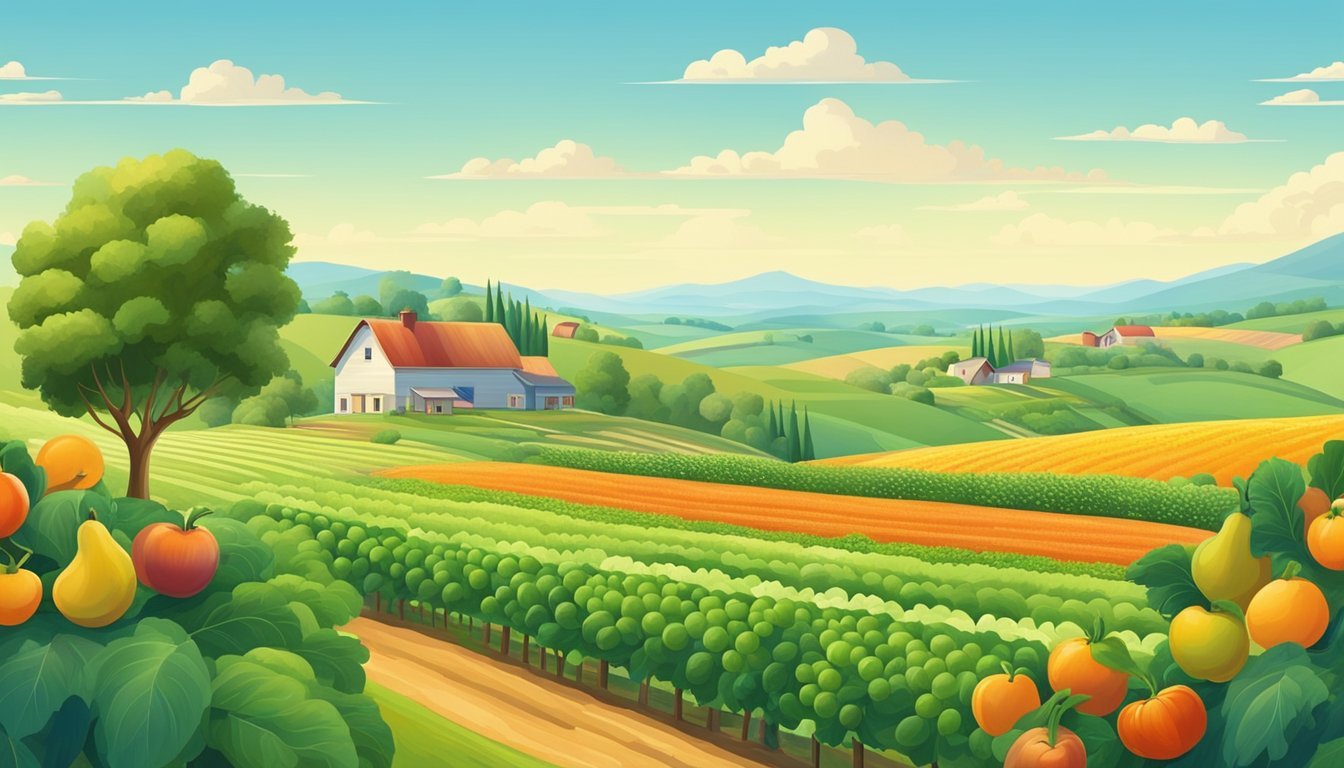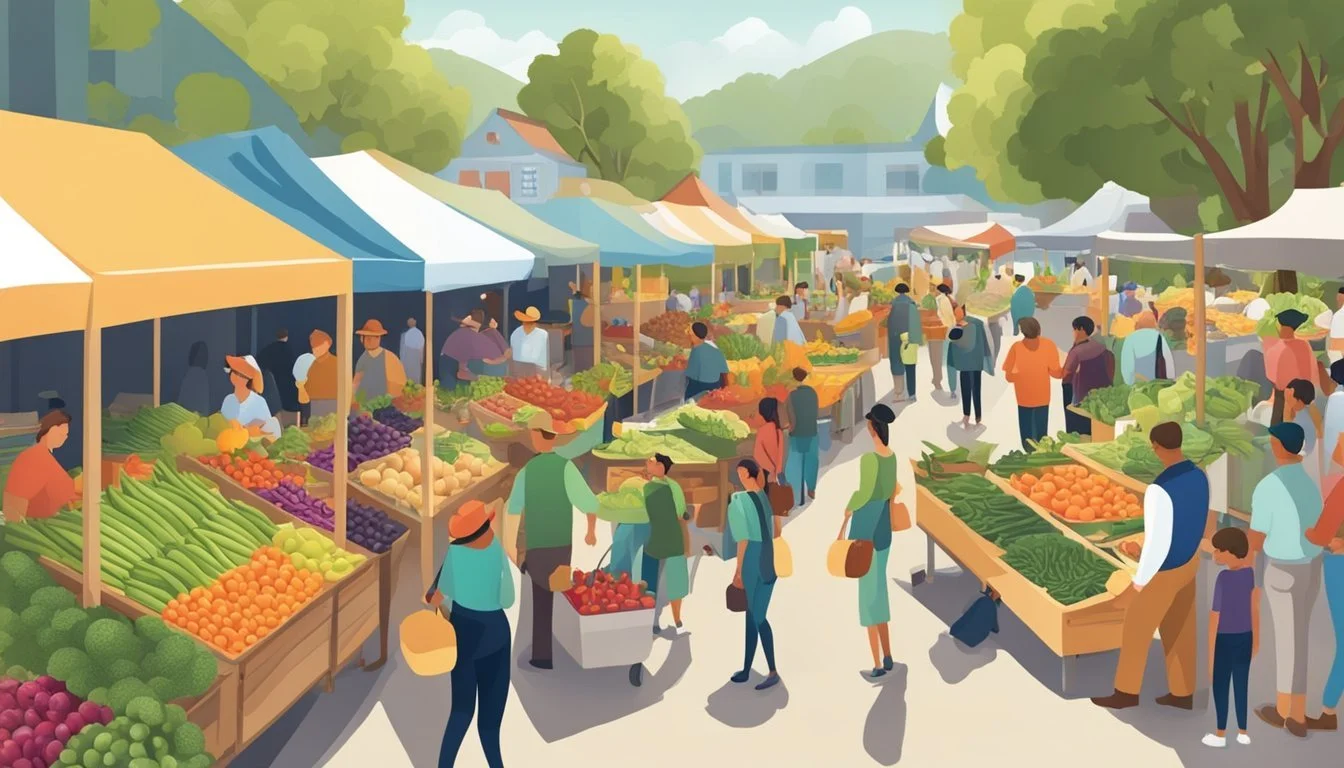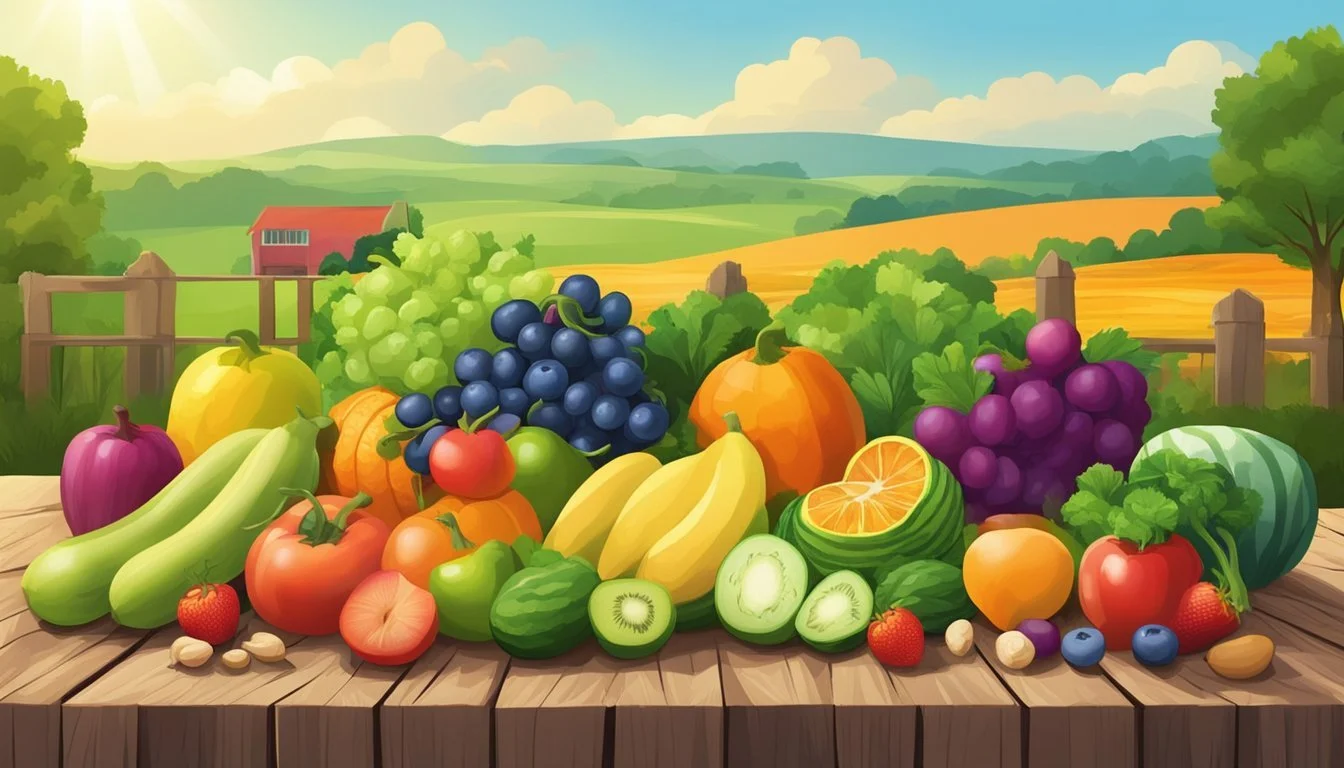Delaware Seasonal Fruit & Veg Guide
Your Essential Calendar
Delaware's farm-to-table movement harnesses the state's vibrant agricultural sector, offering an authentic experience for those who value fresh, local produce. Understanding which fruits and vegetables are in season is critical for anyone looking to engage with Delaware's local food system. Not only does this knowledge support regional farmers, but it also ensures that consumers enjoy produce at its peak of freshness and flavor. Seasonal eating in Delaware brings an array of colorful, nutritious options to the table, each ripe and ready at different times of the year.
The concept of farm to table is ingrained in Delaware's culinary scene, where local produce markets and pick-your-own farms are common. This direct link between producers and consumers fosters a deeper appreciation for the food on our plates and the labor that brings it there. From strawberries in spring to hearty root vegetables in the winter, Delaware's seasonal offerings reflect the rich diversity of its agricultural landscape.
For residents and visitors of Delaware alike, navigating the seasonal availability of produce is made easier with resources such as harvest calendars and local farm guides. These tools provide valuable insights into the timing of crops and assist in planning meals around what is freshly available. Embracing the rhythms of the season encourages sustainable eating habits and supports the local economy, creating a gastronomic culture that is uniquely Delawarean.
What’s in Season in Delaware Right Now?
Understanding Farm to Table in Delaware
In Delaware, the farm to table movement emphasizes the connection between local farms, the food that Delawareans eat, and the health of the community and economy.
The Philosophy of Farm to Table
The philosophy of farm to table in Delaware centers around a deep appreciation and support for local agriculture. This attitude recognizes that the journey of food does not begin at the grocery store; rather, it originates from the state's rich farmlands. The emphasis is on freshness and sustainability, highlighting a direct link between the local orchards, farms, and the consumer’s table.
Traceability: Consumers have a clear understanding of the food's origin.
Community Engagement: The approach encourages stronger ties within the community, as consumers support Delaware businesses and, in return, farmers provide high-quality produce.
Benefits of Farm to Table
The benefits of this concept extend beyond simply knowing where food comes from. They also include:
Quality of Food: Freshness is assured, often implying more nutritious and flavorful food.
Economic Support: By choosing local produce, consumers invest in their local economy and ensure the livelihoods of Delaware farmers.
Environmental Impact: Shorter transportation distances reduce carbon footprints.
Farm to table in Delaware is more than a concept — it's a commitment to a healthier, more sustainable way of living. It allows Delaware residents to savor the produce at its peak, knowing they are also bolstering their local economy and agricultural heritage.
Seasonal Produce Guide
Delaware's diverse climate allows for a bounty of seasonal fruits and vegetables. In planning meals or shopping at local markets, one can look forward to a specific selection of produce each season.
Spring Selections
The arrival of spring in Delaware brings forth a fresh array of vegetables. Asparagus spearheads the season, and one can also find tender, sweet peas along with a variety of leafy greens such as spinach and lettuce. Rhubarb is another spring favorite and is perfect for pies or jams.
Vegetables: Asparagus, Peas, Spinach, Lettuce
Fruits: Rhubarb
Summer Harvest
Summer is prime time for an abundance of fruits and vegetables. Juicy peaches are a highlight of Delaware's summer harvest and are typically available in late July and August. Berries, including strawberries earlier in the season followed by blueberries (how long do blueberries last?), also flourish during summertime.
Vegetables: Tomatoes, Cucumbers, Corn, Green Beans
Fruits: Peaches, Strawberries, Blueberries, Watermelon
Fall Favorites
During fall, the harvest continues with robust flavors. Apples (how long do apples last?) and pumpkins dominate the scene, and both are versatile for a range of recipes, from baked goods to savory dishes. One also finds root vegetables like sweet potatoes and carrots, which are staples for hearty autumn meals.
Vegetables: Pumpkins, Sweet Potatoes, Carrots, Kale
Fruits: Apples, Pears
Winter Availability
Winter in Delaware might offer fewer local produce options, but it is still a season with available crops. Consumers can find an array of storage crops like potatoes and onions that are harvested in fall and kept for winter use. Hardy greens, such as collards, can withstand the chilly temperatures and are in season.
Vegetables: Potatoes, Onions, Collards
Fruits: Stored Apples, Winter Squash
By understanding what is in season, consumers can enjoy the freshest flavors while supporting local agriculture.
Delaware's Farming Landscape
Delaware's agricultural sector is an integral part of the state's economy and cultural heritage, showcasing a diverse array of farming practices and regional specialties.
Key Farming Regions
Sussex County stands as the state's most agriculturally productive area, largely due to its fertile soil and favorable climate. Major farming hubs within the county include Greenwood and Harrington, primarily known for their grain and poultry farms. Kent County, with Dover and Camden-Wyoming, serves as another pivotal farming region specializing in various crops, including corn and soybeans. (how long do soybeans last?) Moving north, New Castle County hosts farms around Middletown and Felton, which contribute significantly to the local produce supply.
Types of Farms in Delaware
Delaware features a range of farm types, reflecting its agricultural diversity:
Family Farms: Many farms in Delaware remain family-owned, passed through generations, with an emphasis on traditional farming techniques and community involvement.
Specialty Farms: These farms often focus on specific products such as fruits, vegetables, and organic items. For instance, Ramsey's Farm near Wilmington offers community-engaged activities like u-pick seasons for pumpkins.
Livestock Farms: Poultry farming dominates this segment in Delaware, complemented by dairy and beef operations scattered across the state.
Crop Farms: Farmers across Delaware engage in extensive crop production, including soybeans, corn, and wheat, benefiting from the rich, loamy soils common to the region.
Each farm type plays a distinctive role in bolstering Delaware's farm-to-table movement and sustaining the local food systems.
Picking Your Own Produce
In Delaware, engaging in U-pick activities means embracing the state’s agricultural richness. From the end of May to June, berry season marks the kickoff of U-pick fruit farms, while autumn brings an abundance of pumpkins and other seasonal vegetables.
U-Pick Fruit Farms
Strawberries often signal the beginning of the U-pick season in Delaware. As spring transforms into summer, local farms open their fields for visitors to pick their own strawberries, followed closely by a variety of berries such as blueberries and raspberries.
Late May to June: Berries including strawberries, blueberries, raspberries
July to August: Peaches, nectarines
September to October: Apples
Vegetable Patches for Picking
Local farms in Delaware also offer the pick-your-own experience for vegetables. These patches provide families with the opportunity to gather fresh produce such as tomatoes, beans, and greens directly from the plant.
Summer: Tomatoes, green beans, cucumbers
Fall: Pumpkins, squash, kale
Specialty U-Pick Events
Throughout the year, some farms may host specialty U-pick events that focus on unique offerings or experiences. These events often coincide with the harvest of less common U-pick fruits or vegetables, and they may offer additional activities like hayrides or corn mazes.
Summer: Specialty berry varieties, herbs
Fall: Pick-your-own pumpkins, ornamental corn
Locating Fresh Produce Markets
In Delaware, consumers have multiple avenues to obtain fresh, locally-grown fruits and vegetables. Each method offers a unique experience, from the community spirit of farmers' markets to the charm of roadside stands.
Farmers' Markets
Delaware's farmers' markets are community-run and showcase a variety of locally grown produce. They offer consumers a chance to purchase the freshest produce directly from the farm. Markets are located throughout the state, including in New Castle, Kent, and Sussex counties. These markets not only provide fresh options but also enable buyers to support local agriculture and enjoy seasonal selections.
New Castle County Farmers' Market
Kent County Farmers' Market
Sussex County Farmers' Market
Roadside Stands
Along Delaware's roads, travelers will find numerous roadside stands. These stands often feature seasonal fruits and vegetables, and sometimes provide a selection of handpicked flowers and local honey.
Example:
Dagsboro Roadside Stand: Known for ripe watermelons and sweet corn during the summer months.
Local Grocery Access
Delaware also has local grocery stores that prioritize stocking fresh produce. These stores often source from nearby farms to ensure quality and support the community's economy.
Local Grocery in Dagsboro: Offers a range of fresh fruits and vegetables like tomatoes, leafy greens, and berries.
Season-Specific Delaware Produce and Activities
In Delaware, each season brings its own unique produce and corresponding activities that celebrate the state's agricultural bounty. Visitors and residents can engage with local food sources through various festive events that mark the changing produce landscape.
Summer Festivities
During the summer, Delawareans enjoy the peak of fresh produce like blueberries and apples. They celebrate these bounties at local farmer's markets and through U-pick experiences at farms across the state. One such event is the Summer Harvest Festival, typically held in August, where guests can enjoy live music, fresh food, and family-friendly activities like hayrides.
Autumn and Harvest Events
Autumn in Delaware is synonymous with harvest events. Farms transform into family playgrounds featuring corn mazes and pumpkin picking. As the leaves change color, visitors can indulge in the last of the summer's harvest and the first of fall's offerings. Kingsley Orchards hosts activities that reflect this transition, with a special emphasis on the gathering of apples and the excitement of navigating their corn mazes.
Winter Celebrations
The chill of winter doesn't stop the warmth of festivities in Delaware. Holiday season is especially vibrant with bonfires and Christmas tree hunting at local farms. Many farms offer Christmas tree farms with a variety of trees where families can choose and cut their own Christmas tree. The experience is often enhanced with a cozy hayride around the farm, which operates through December.
Community Supported Agriculture (CSA)
Community Supported Agriculture in Delaware offers an opportunity for individuals to receive a steady supply of fresh and locally-grown produce while supporting local farming communities.
Joining a CSA Program
One can join a CSA program in Delaware by purchasing a subscription from local farms like the Food Bank of Delaware's five-acre farm or Highland Orchards. These subscriptions often come in the form of seasonal shares, where one typically receives weekly or bi-weekly boxes of the farm's current harvest.
Steps to Join:
Research local CSA providers in Delaware.
Choose a farm based on produce variety and delivery/pick-up options.
Purchase a share for the season, with the understanding that the quantity and types of produce may vary.
Advantages of CSA Membership
Members of a CSA directly support Delaware's agricultural economy and gain access to fresh, seasonal produce. In return, farmers receive a stable income base to fund their operations.
Benefits Include:
Freshness: CSA produce is often harvested at the peak of ripeness.
Support: Members support sustainable farming practices and Delaware families in need.
Variety: Highland Orchards, for example, provides pesticide-free fruits, vegetables, herbs, and flowers.
Connection: Engaging with where one's food comes from and fostering a local community spirit.
Through CSA programs, Delaware residents obtain high-quality, fresh produce and contribute to the vitality of local farms.








